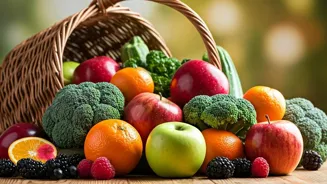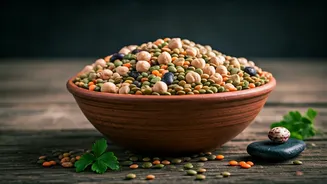Fiber's Vital Role
Fiber, a type of carbohydrate found in plant-based foods, plays a pivotal role in maintaining optimal health, especially concerning digestive functions.
It's broadly categorized into soluble and insoluble fibers, each performing distinct tasks. Soluble fiber dissolves in water, forming a gel-like substance that aids in lowering cholesterol levels and regulating blood sugar. Insoluble fiber, on the other hand, doesn't dissolve but adds bulk to the stool, facilitating smooth bowel movements and preventing constipation. Getting enough fiber can lower your risk of type 2 diabetes and heart disease, while also helping to maintain a healthy weight. The recommended daily intake of fiber is about 25 to 30 grams, though many people don't get enough. Including a variety of fiber-rich foods in your diet is essential to reaping its numerous health benefits.
Fruits: Fiber Powerhouses
Fruits are a delectable source of fiber, providing not only essential nutrients but also satisfying your sweet cravings. Consider berries, which are an excellent choice, as raspberries and blackberries are packed with fiber, along with antioxidants. Apples and pears, especially when eaten with their skins, are also great sources. An apple can offer around 4.4 grams of fiber. Avocados, while technically a fruit, are also incredibly high in fiber and healthy fats, adding to their nutritional value. The diversity in fruit options makes it easier to include them in your daily diet, from snacking on whole fruits to incorporating them into smoothies or salads. Eating fruits with their skins on will give the best fiber content. Remember to consume different fruits to experience a range of vitamins, minerals, and fiber types for overall well-being.
Vegetables: Fiber Champions
Vegetables are nutritional powerhouses that are an excellent way to significantly increase your fiber intake. Leafy greens like spinach and kale provide fiber alongside crucial vitamins and minerals. Root vegetables such as sweet potatoes and yams are also rich sources, offering both fiber and complex carbohydrates for sustained energy. Cruciferous vegetables, including broccoli and Brussels sprouts, are packed with fiber and boast numerous health benefits, including potential cancer-fighting properties. Other high-fiber vegetables include carrots, green beans, and peas. Enjoying a variety of vegetables ensures a balanced intake of different types of fiber and other essential nutrients. Vegetables are versatile; they can be eaten raw, steamed, roasted, or added to soups and stews, making it easier to incorporate them into your daily meals.
Moringa, Sweet Potato, and More
Consider the following options that are also great sources of fiber. Moringa, which is often consumed as a powder or added to smoothies and dishes, provides a concentrated dose of fiber and other essential nutrients. Sweet potatoes offer a good amount of fiber, especially when eaten with the skin. Green bananas, a staple in many diets, contribute to your fiber intake, along with providing resistant starch, which can boost gut health. Jackfruit, another versatile fruit, is high in fiber and offers a unique texture. These foods not only provide fiber but also introduce variety and diverse nutrients to your diet. Including these options can make eating enough fiber more enjoyable and offer additional health advantages.
Fiber's Health Benefits
The benefits of consuming fiber are plentiful and far-reaching. Fiber promotes healthy digestion by preventing constipation and supporting regular bowel movements. Furthermore, it assists in controlling blood sugar levels, making it a valuable nutrient for people with diabetes or those at risk. Fiber can also help with weight management, as it increases feelings of fullness, which can lead to reduced calorie intake. By eating a high-fiber diet, you could also lower your chances of developing heart disease. Fiber helps to lower cholesterol levels, which is beneficial for maintaining a healthy cardiovascular system. Regularly including fiber in your diet is an important step in maintaining your overall health and well-being, affecting everything from digestion to disease prevention.
Practical Dietary Tips
Incorporating more fiber into your diet is easier than you might think. Start gradually by increasing your fiber intake to avoid digestive discomfort like bloating. Ensure that you're drinking plenty of water throughout the day to help the fiber move through your digestive system effectively. Read food labels carefully, paying attention to the fiber content per serving. Prioritize whole, unprocessed foods over refined ones, as they typically contain more fiber. Make small, consistent changes to your meals, such as adding a handful of berries to your breakfast cereal or substituting white bread for whole-wheat bread. Keep in mind that getting around 32g of fiber every day is important. Planning and preparing your meals can help you meet your fiber goals more consistently. The more you focus on these changes, the easier it will be to adopt a high-fiber diet.





















